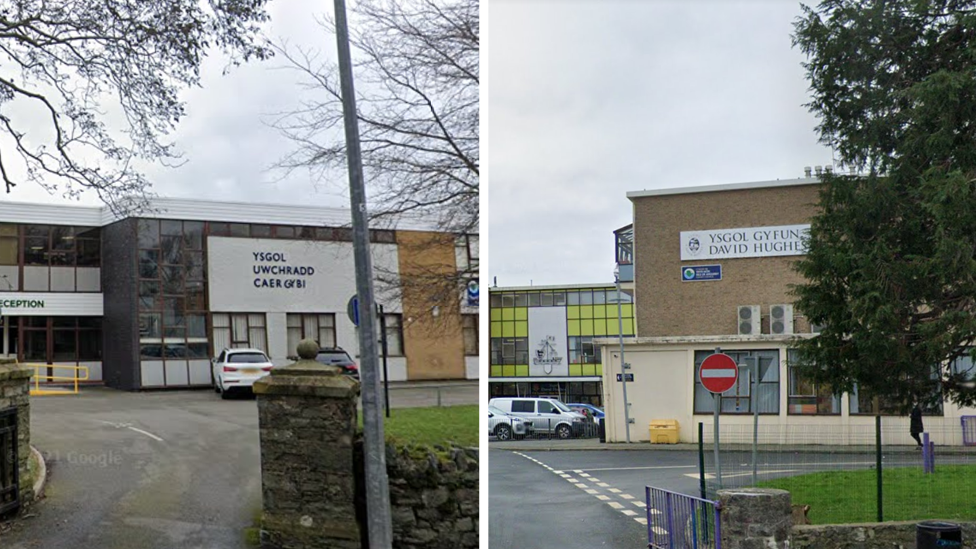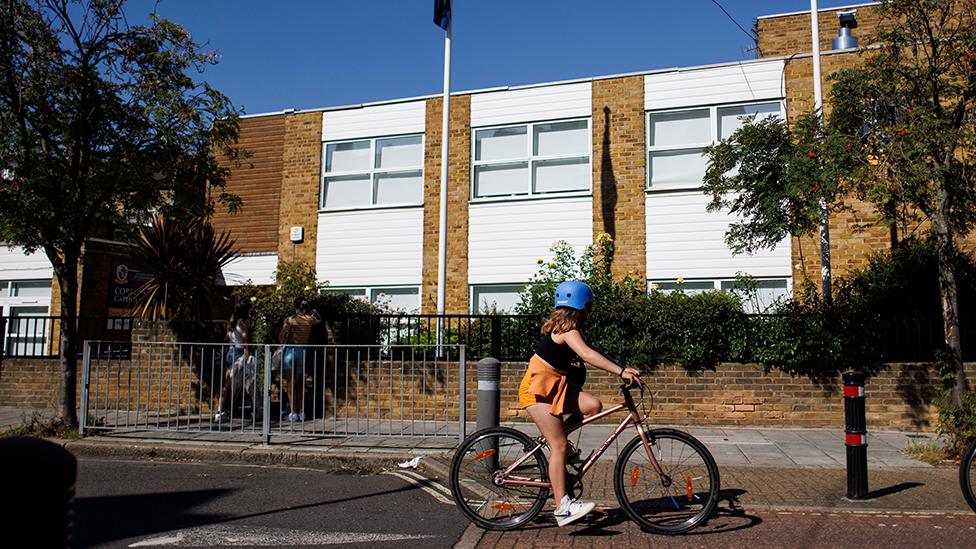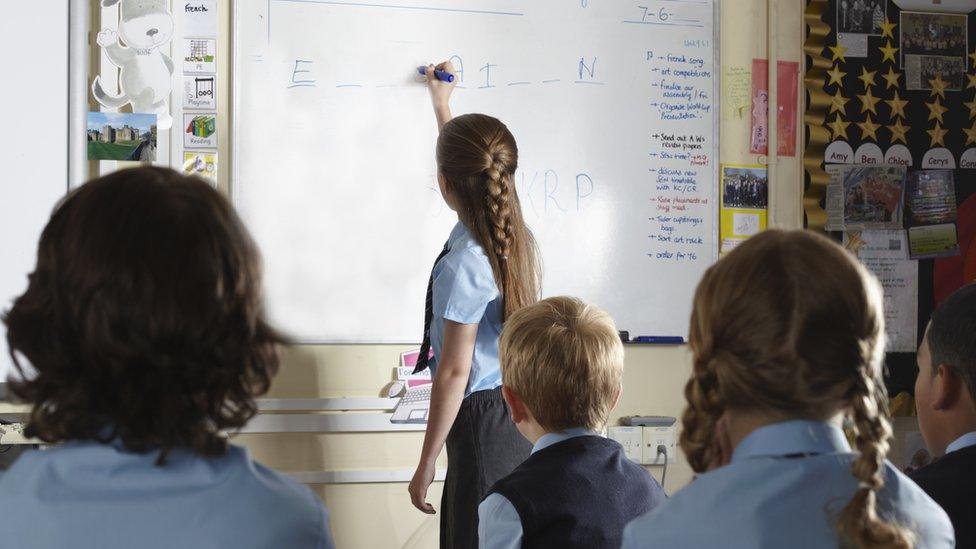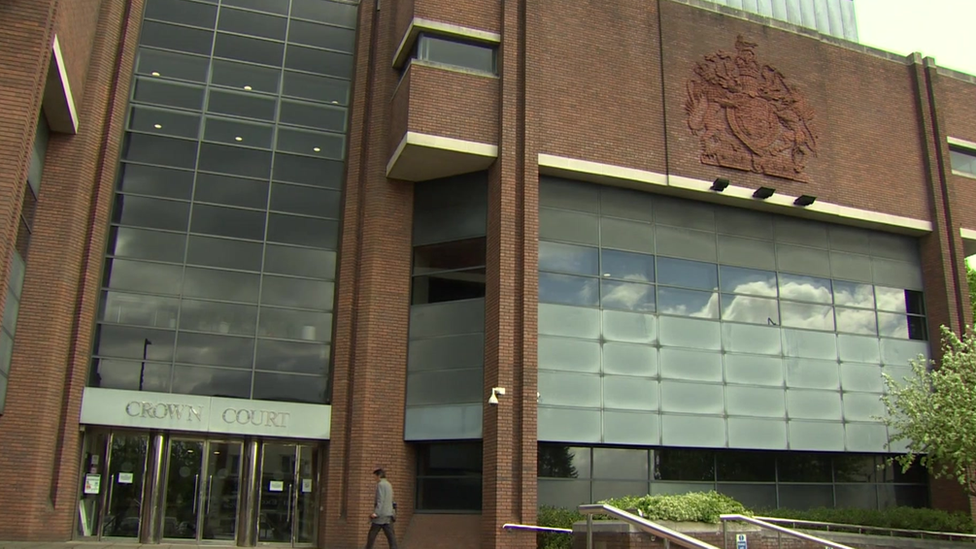Concrete in Wales schools: Parents 'don't want blame game'
- Published

Ysgol Uwchradd Caergybi and Ysgol David Hughes in Anglesey have been closed
Wales' education minister has been criticised for not clearly communicating with parents over the state of concrete in schools.
The children's commissioner said statements from Jeremy Miles have not been "easy to understand".
Rocio Cifuentes also warned against a "blame game" after Mr Miles criticised the UK government for not quickly disclosing new safety warnings.
The Welsh government was asked for comment.
Meanwhile Mr Miles has warned that more schools could close after two were shut on Monday.
Fears over reinforced autoclaved aerated concrete (RAAC) led to more than 100 educational buildings being told to close last week in England.
The Health and Safety Executive has said that RAAC is now beyond its lifespan and may "collapse with little or no notice".
On Monday Mr Miles accused the UK government of leaving it until Sunday night to provide new evidence the material was posing a greater safety risk.
The UK government said it has kept the Welsh government informed on its concerns about RAAC.
Meanwhile the Welsh Conservatives questioned why proactive action was not taken in schools after problems were identified in Withybush Hospital, in Haverfordwest, in mid-August.
Rocio Cifuentes, Wales' children's commissioner, said the situation has "the potential to cause significant anxiety to children and their parents".
The children's rights' watchdog said: "Statements issued by the minister so far don't give families the clarity they need on what this means for them or the next steps for their school, in a way that is easy to understand.
"What children and their families need to hear is not a blame game but details of the extent of the problem, what exactly will happen over the next few weeks and reassurance that schools are safe.
"It is unacceptable that this situation has been allowed to develop to the point of disrupting children's education and causing worry to families."
More schools could close
On Tuesday Mr Miles said more schools could be closed as work is done to identify if they contain concrete that is at risk of collapsing.
The minister said the government was working with councils and would identify "over this week and next week" any schools which may be at risk.
"I can't rule that out," he told BBC Radio Wales Breakfast when asked about further closures.
Asked why he was not able to say definitively if school buildings contained RAAC, Mr Miles said the Welsh government had asked councils to include that in their reports this year.
"They've been working to the guidance since it changed in 2020… as part of supplementary work we're doing this week and next week we will be able to verify that information right across Wales," he said.
Watch: How RAAC concrete can crumble under pressure
He also pointed out that the situation in Wales was different from other parts of the UK as a large number of schools had been built before RAAC was in use between the 1950s and 1990s.
"Since RAAC has stopped being used we've had many, many new schools built in Wales - 140 in the first wave of investment and another 200 schools as part of the current wave of investment," said Mr Miles.
"The commitment of the Welsh government and local councils in Wales to both capital maintenance of the existing school estate and the huge transformation programme in building new schools and colleges, I think, is really important context for families when they are thinking about this."
'Leaky... draughty'
A Welsh education expert said too many children were learning in rundown and dilapidated classrooms, with "leaky roofs and draughty windows".
Gareth Evans, of University of Wales Trinity Saint David, said: "This to me is symptomatic of a much broader issue related to wales' ageing school stock.
"A number of schools I have visited are, quite literally, at or near breaking point. The Welsh government's long term capital investment programme, 21st Century Schools, has been transformational for some but doesn't scratch the surface of what is needed."
The action in Wales followed a decision last week in England to close a number of schools over RAAC fears.
Craig Williams, Welsh Conservative MP for Montgomeryshire, said that the issue needed "perspective".
"Before we start writing blank cheques, in England there are 22,000 schools, 200 at the moment have been found with this problem," he said.
David TC Davies, Conservative Welsh Secretary, claimed the Welsh government had "not followed the decisive steps that have been taken for 18 months by the UK government in England".Mr TC Davies also added that "some of what's being said by people trying to turn this into a political football is deeply concerning and unfair".
Earlier in August patients were moved out of parts of Withybush Hospital, while RAAC had also been found in two other hospitals.
'Guidance changed'
The director of the National Association of Head Teachers (NAHT) Cymru said the union had not been contacted by any head teacher who thought it was an issue in their school.
But she asked why the guidance had changed "at the eleventh hour before the schools are due to go back".
"Why have they [the UK government] not been clearer with the Welsh government with what the issue is?" Laura Doel said.
She urged experts to get the review of schools done "as swiftly as possible" so the union could get information out to any worried parents and ensure schools remained open.
"We need to be on top of this, offering parents reassurance that schools are safe," she said.
A senior engineer warned there needed to be an urgent safety review of all public buildings in Wales to see if they also contain the concrete.
"We can't really begin to move forward until we know the full extent," Keith Jones, Wales Director of the Institution of Civil Engineers said.
The Education Minister Jeremy Miles has criticised the UK government for not providing written evidence of new safety concerns until Sunday night.
The Welsh government has confirmed it spoke on Friday with its counterparts at Westminster and that some new evidence was shared at the meeting.
A spokesperson said: "It is hugely regrettable that the evidence that has apparently been developed over the summer has been withheld until the night before the first day back of term."
The spokesperson also confirmed that some local authorities have completed reviews of their school buildings and that they are underway in others.
It is not clear whether the reviews constitute the identification or the testing of the concrete - the Welsh government has been asked to comment.
The Welsh government has been speaking to councils since last week's announcement in England.
On Monday the Welsh government said it hoped within two weeks to review the information, and promised to work with structural engineers to assess any newly discovered RAAC.
That exercise is due to be completed by December.
Related topics
- Published13 February 2024

- Published1 September 2023

- Published1 September 2023
